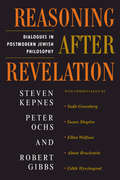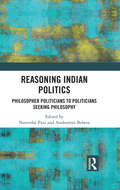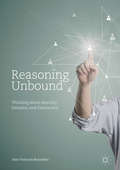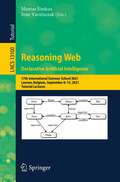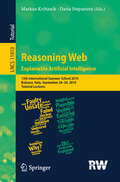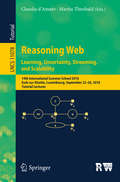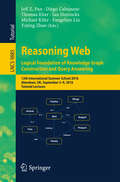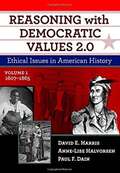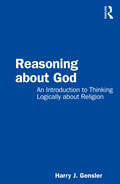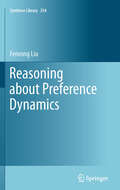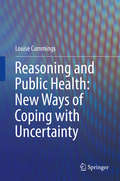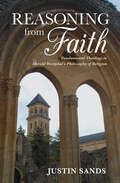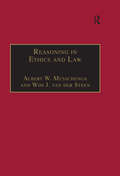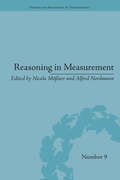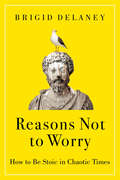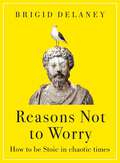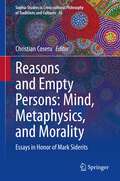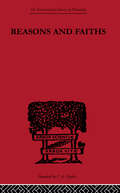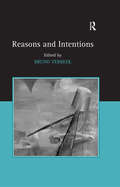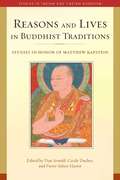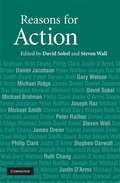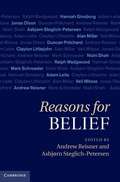- Table View
- List View
Reasoning After Revelation: Dialogues In Postmodern Jewish Philosophy (Radical Traditions Ser.)
by Steven KepnesIn Reasoning After Revelation: Dialogues in Postmodern Jewish Philosophy, three preeminent Jewish scholars debate the form and meaning of Postmodern Jewish Philosophy after the failures of the great secular ideologies of modern western civilization. Emulating the methods as well as the premises of Talmudic argumentation, the authors present their responses as dialogues joined by a common love of the rabbinic tradition of commentary and interpretation of the Bible. The composers, Peter Ochs, Robert Gibbs, and Steven Kepnes, contemplate where Judaism has beenand where it is headed: on what basis will modern Jews now reason about the meaning of Jewish existence and the relevance of age-old Biblical traditions to the moral and social crises of the twenty-first century? The dialogues are further enriched by a set of responses from leading Jewish philosophers: Elliot R. Wolfson, Edith Wyschogrod, Almut Sh. Bruckstein, Yudit Kornberg Greenberg, and Susan E. Shapiro. }Postmodern Jewish thinkers understand their Jewishness differently, but they all share a fidelity to what they call the Torah and to communal practices of reading and social action that have their bases in rabbinic interpretations of biblical narrative, law, and belief. Thus, postmodern Jewish thinking is thinking about God, Jews, and the worldwith the texts of the Torahin the company of fellow seekers and believers. It utilizes the tools of philosophy, but without their modern premises. Moreover, this form of Jewish thinking provides resources for philosophically disciplined readings of scripture by Jews, Christians, and Moslems seeking alternatives to the reductive discourses of secular academia, on the one hand, and to antimodern religious fundamentalisms, on the other. Postmodern Jewish Philosophy aims to utilize rabbinic modes of thinking to provide a model for ethical and religious thought in the twenty-first century, one which moves beyond the dichotomy of relativism and imperialism and is simultaneously definite and pluralistic. In Reasoning After Revelation: Dialogues in Postmodern Jewish Philosophy, three preeminent Jewish scholars debate the form and meaning of Postmodern Jewish Philosophy after the failures of the great secular ideologies of modern western civilization. Emulating the methods as well as the premises of Talmudic argumentation, the authors present their responses as dialogues joined by a common love of the rabbinic tradition of commentary and interpretation of the Bible. The composers, Peter Ochs, Robert Gibbs, and Steven Kepnes, contemplate where Judaism has beenand where it is headed: on what basis will modern Jews now reason about the meaning of Jewish existence and the relevance of age-old Biblical traditions to the moral and social crises of the twenty-first century? The dialogues are further enriched by a set of responses from leading Jewish philosophers: Elliot R. Wolfson, Edith Wyschogrod, Almut Sh. Bruckstein, Yudit Kornberg Greenberg, and Susan E. Shapiro.
Reasoning Indian Politics: Philosopher Politicians to Politicians Seeking Philosophy
by Narendar Pani Anshuman BeheraThis volume examines the multiple forms of reasoning in Indian politics and explores a framework to understand them. In the process, it looks at a series of issues involving the relationship between politics and philosophy, including the status of political theory, political practices, identity politics, and political ontology. The book argues that in the years leading up to and soon after independence, the task of conceptualizing politics was largely in the domain of practising politicians who built theories and philosophical methods, and further took those visions into the practice of their politics. It maintains that Indian politicians since then have not been as inclined to articulate their theories or methods of politics. This book traces the transition from philosopher politicians to politicians seeking philosophy in Indian polity in the post-independence era and its implications for current practices. It views Indian political philosophy from the standpoints of political theorists, philosophers, and practitioners. With expert and scholarly contributions, this volume will be of interest to students and researchers of Indian political thought and political philosophy, social sciences, and humanities.
Reasoning Unbound: Thinking about Morality, Delusion and Democracy
by Jean-François BonnefonThis book argues that the science of reasoning will prove most useful if focused on studying what human reasoning does best - understanding people. Bonnefon argues that humanity's unique reasoning abilities developed in order to handle the complexities of cooperative social life. Accordingly, human beings became exquisite students of the minds of other people to predict the kind of decisions they make, and assess their character. In particular, this volume explores the inferences humans make about the moral character of others, how they delude themselves about their own moral character, and the ways in which they can see through the delusions of others. In conclusion, the book considers how to leverage the power of human reasoning in order to sustain democratic life. This work will interest scholars and students working in fields including theory of mind, decision-making, moral cognition, critical thinking, experimental philosophy, and behavioural economics, as well as policy makers interested in how reasoning impacts our political understanding.
Reasoning Web. Declarative Artificial Intelligence: 17th International Summer School 2021, Leuven, Belgium, September 8–15, 2021, Tutorial Lectures (Lecture Notes in Computer Science #13100)
by Mantas Šimkus Ivan VarzinczakThe purpose of the Reasoning Web Summer School is to disseminate recent advances on reasoning techniques and related issues that are of particular interest to Semantic Web and Linked Data applications. It is primarily intended for postgraduate students, postdocs, young researchers, and senior researchers wishing to deepen their knowledge. As in the previous years, lectures in the summer school were given by a distinguished group of expert lecturers.The broad theme of this year's summer school was again “Declarative Artificial Intelligence” and it covered various aspects of ontological reasoning and related issues that are of particular interest to Semantic Web and Linked Data applications. The following eight lectures were presented during the school: Foundations of Graph Path Query Languages; On Combining Ontologies and Rules; Modelling Symbolic Knowledge Using Neural Representations; Mining the Semantic Web with Machine Learning: Main Issues That Need to Be Known; Temporal ASP: From Logical Foundations to Practical Use with telingo; A Review of SHACL: From Data Validation to Schema Reasoning for RDF Graphs; and Score-Based Explanations in Data Management and Machine Learning.
Reasoning Web. Explainable Artificial Intelligence: 15th International Summer School 2019, Bolzano, Italy, September 20–24, 2019, Tutorial Lectures (Lecture Notes in Computer Science #11810)
by Markus Krötzsch Daria StepanovaThis volume contains lecture notes of the 15th Reasoning Web Summer School (RW 2019), held in Bolzano, Italy, in September 2019. The research areas of Semantic Web, Linked Data, and Knowledge Graphs have recently received a lot of attention in academia and industry. Since its inception in 2001, the Semantic Web has aimed at enriching the existing Web with meta-data and processing methods, so as to provide Web-based systems with intelligent capabilities such as context awareness and decision support. The Semantic Web vision has been driving many community efforts which have invested a lot of resources in developing vocabularies and ontologies for annotating their resources semantically. Besides ontologies, rules have long been a central part of the Semantic Web framework and are available as one of its fundamental representation tools, with logic serving as a unifying foundation. Linked Data is a related research area which studies how one can make RDF data available on the Web and interconnect it with other data with the aim of increasing its value for everybody. Knowledge Graphs have been shown useful not only for Web search (as demonstrated by Google, Bing, etc.) but also in many application domains.
Reasoning Web. Learning, Uncertainty, Streaming, and Scalability: 14th International Summer School 2018, Esch-sur-Alzette, Luxembourg, September 22–26, 2018, Tutorial Lectures (Lecture Notes in Computer Science #11078)
by Claudia D’Amato Martin TheobaldThis volume contains lecture notes of the 14th Reasoning Web Summer School (RW 2018), held in Esch-sur-Alzette, Luxembourg, in September 2018. The research areas of Semantic Web, Linked Data, and Knowledge Graphs have recently received a lot of attention in academia and industry. Since its inception in 2001, the Semantic Web has aimed at enriching the existing Web with meta-data and processing methods, so as to provide Web-based systems with intelligent capabilities such as context awareness and decision support. The Semantic Web vision has been driving many community efforts which have invested a lot of resources in developing vocabularies and ontologies for annotating their resources semantically. Besides ontologies, rules have long been a central part of the Semantic Web framework and are available as one of its fundamental representation tools, with logic serving as a unifying foundation. Linked Data is a related research area which studies how one can make RDF data available on the Web and interconnect it with other data with the aim of increasing its value for everybody. Knowledge Graphs have been shown useful not only for Web search (as demonstrated by Google, Bing, etc.) but also in many application domains.
Reasoning Web: 12th International Summer School 2016, Aberdeen, UK, September 5-9, 2016, Tutorial Lectures (Lecture Notes in Computer Science #9885)
by Jeff Z. Pan, Diego Calvanese, Thomas Eiter, Ian Horrocks, Michael Kifer, Fangzhen Lin and Yuting ZhaoThis volume contains some lecture notes of the 12th Reasoning Web Summer School (RW 2016), held in Aberdeen, UK, in September 2016.In 2016, the theme of the school was “Logical Foundation of Knowledge Graph Construction and Query Answering”. The notion of knowledge graph has become popular since Google started to use it to improve its search engine in 2012. Inspired by the success of Google, knowledge graphs are gaining momentum in the World Wide Web arena. Recent years have witnessed increasing industrial take-ups by other Internet giants, including Facebook's Open Graph and Microsoft's Satori. The aim of the lecture note is to provide a logical foundation for constructing and querying knowledge graphs. Our journey starts from the introduction of Knowledge Graph as well as its history, and the construction of knowledge graphs by considering both explicit and implicit author intentions. The book will then cover various topics, including how to revise and reuse ontologies (schema of knowledge graphs) in a safe way, how to combine navigational queries with basic pattern matching queries for knowledge graph, how to setup a environment to do experiments on knowledge graphs, how to deal with inconsistencies and fuzziness in ontologies and knowledge graphs, and how to combine machine learning and machine reasoning for knowledge graphs.
Reasoning Web: Logical Foundation of Knowledge Graph Construction and Query Answering
by Diego Calvanese Jeff Z. Pan Yuting Zhao Fangzhen Lin Thomas Eiter Ian Horrocks Michael KiferThis volume contains some lecture notes of the 12th Reasoning Web Summer School (RW 2016), held in Aberdeen, UK, in September 2016. In 2016, the theme of the school was "Logical Foundation of Knowledge Graph Construction and Query Answering". The notion of knowledge graph has become popular since Google started to use it to improve its search engine in 2012. Inspired by the success of Google, knowledge graphs are gaining momentum in the World Wide Web arena. Recent years have witnessed increasing industrial take-ups by other Internet giants, including Facebook's Open Graph and Microsoft's Satori. The aim of the lecture note is to provide a logical foundation for constructing and querying knowledge graphs. Our journey starts from the introduction of Knowledge Graph as well as its history, and the construction of knowledge graphs by considering both explicit and implicit author intentions. The book will then cover various topics, including how to revise and reuse ontologies (schema of knowledge graphs) in a safe way, how to combine navigational queries with basic pattern matching queries for knowledge graph, how to setup a environment to do experiments on knowledge graphs, how to deal with inconsistencies and fuzziness in ontologies and knowledge graphs, and how to combine machine learning and machine reasoning for knowledge graphs.
Reasoning With Democratic Values 2. 0: Ethical Issues In American History, Volume 1: 1607-1865
by David E. Harris Anne-Lise Halvorsen Paul F. DainNow thoroughly updated and extensively revised for use in today’s history classrooms, this time-honored classic has never been more important than right now. <p><p>The new edition, Reasoning with Democratic Values2.0, presents an engaging approach to teaching U.S. history that promotes critical thinking and social responsibility. <p><p>In Volume 1 students investigate 20 significant historical episodes, arranged chronologically, beginning with the colonial era and ending with Reconstruction. Each carefully researched story examines an ethical decision made by an individual or group from the American past, and is guaranteed to excite students’ imaginations and spark lively classroom discussions involving core values of American democracy—liberty, equality, life, property, truth, and diversity. <p><p>The discussions aim to develop more mature moral reasoning by students while deepening their knowledge of American history. Each chapter contains five types of learning activities: Facts of the Case, Historical Understanding, Expressing Your Reasoning, Key Concepts from History, and Historical Inquiry. <p><p> In Volume 1, students can grapple with such ethical dilemmas as: <p> Should the Commonwealth of Massachusetts have granted reparation to the enslaved woman, Belinda Royall? <p>Should Thomas Jefferson have freed his slaves? <p>Should Juan Seguín have fought against the United States in the Mexican–American War? <p>Should Robert E. Lee have accepted command of the Union Army? <p><p>You can also purchase a comprehensive Instructor’s Manual that includes the rationale for the teaching approach, guidance for selecting chapters, direction for leading classroom discussions of ethical issues, suggestions for assessment and grading, answers for the learning activities, and more! <p><p> PROFESSIONAL DEVELOPMENT: The authors are available, at no fee, to conduct professional development programs for teachers and/or administrators regarding teaching with RDV 2.0. Visit www.rdv2.org for more details, including author contact information. The authors have committed their royalties to teacher education.
Reasoning about God: An Introduction to Thinking Logically about Religion
by Harry J GenslerReasoning about God is an introduction to philosophy of religion, meeting college students where they are with their own doubts and questions. Each chapter begins with a passage from a fictional student, who raises intellectual problems against God, which is followed by the author’s informed and easy-to-understand analysis. This debate structure allows student readers to clearly see the clash of ideas, gets them involved in the issues, and encourages their critical thinking (since students are pushed to find flaws in the ideas). It emulates the structure the author followed successfully in his Ethics: A Contemporary Introduction, which is now in its third edition and has been translated five times into other languages. This structure works well in philosophy of religion, even better than in does in ethics. Key Features of Reasoning about God: Written clearly and concisely, making difficult issues easy to understand. Makes a strong case for belief in God, based on various factors – including arguments about fine-tuning, Kalam, and near-death experiences – as well as approaches that are more instinctual or emotional. A major theme of the book is "There are many paths to God." Includes material on both traditional topics of philosophy of religion (like the problem of evil) and other related topics of interest (like whether religion is harmful, life after death, the variety of world religions, and the meaning of life). Explores how science connects to God’s existence, arguing that recent science is friendlier toward religion than older science. Written by a Christian author, whose defense of belief in God works with other theistic traditions as well (like Islam and Judaism).
Reasoning about Preference Dynamics
by Fenrong LiuOur preferences determine how we act and think, but exactly what the mechanics are and how they work is a central cause of concern in many disciplines. This book uses techniques from modern logics of information flow and action to develop a unified new theory of what preference is and how it changes. The theory emphasizes reasons for preference, as well as its entanglement with our beliefs. Moreover, the book provides dynamic logical systems which describe the explicit triggers driving preference change, including new information, suggestions, and commands. In sum, the book creates new bridges between many fields, from philosophy and computer science to economics, linguistics, and psychology. For the experienced scholar access to a large body of recent literature is provided and the novice gets a thorough introduction to the action and techniques of dynamic logic.
Reasoning and Public Health: New Ways of Coping with Uncertainty
by Louise CummingsThis book argues that in order to be truly effective, public health must embrace a group of reasoning strategies that have traditionally been characterized as informal fallacies. It will be demonstrated that these strategies can facilitate judgements about complex public health issues in contexts of uncertainty. The book explains how scientists and lay people routinely resort to the use of these strategies during consideration of public health problems. Although these strategies are not deductively valid, they are nevertheless rationally warranted procedures. Public health professionals must have a sound understanding of these cognitive strategies in order to engage the public and achieve their public health goals. The book draws upon public health issues as wide ranging as infectious diseases, food safety and the potential impact on human health of new technologies. It examines reasoning in the context of these issues within a large-scale, questionnaire-based survey of nearly 900 members of the public in the UK. In addition, several philosophical themes run throughout the book, including the nature of uncertainty, scientific knowledge and inquiry. The complexity of many public health problems demands an approach to reasoning that cannot be accommodated satisfactorily within a general thinking skills framework. This book shows that by developing an awareness of these reasoning strategies, scientists and members of the public can have a more productive engagement with public health problems.
Reasoning from Faith: Fundamental Theology in Merold Westphal’s Philosophy of Religion
by Justin SandsMerold Westphal is considered to be one of the preeminent Continental philosophers of religion. His articulation of faith as the task of a lifetime has become a touchstone in contemporary debates concerning faith's relationship to reason. As Justin Sands explores his philosophy, he illuminates how Westphal’s concept of faith reveals the pastoral, theological intent behind his thinking. Sands sees Westphal's philosophy as a powerful articulation of Protestant theology, but one that is in ecumenical dialogue with questions concerning apologetics and faith's relationship to ethics and responsibility, a more Catholic point of view. By bringing out these features in Westphal's philosophy, Sands intends to find core philosophical methodologies as well as a passable bridge for philosophers to cross over into theological discourses.
Reasoning in Ethics and Law: The Role of Theory Principles and Facts (Avebury Series in Philosophy)
by Albert W. Musschenga Wim J. SteenLegal and moral reasoning share much methodology, and they address similar problems. This volume charts two shared problems: the relation between theory, principles and particular judgments; and the role of facts and factual assertions in normative settings. The relation between 'theory' and 'practice' and between 'principle' and 'particular judgment' has become the subject of much debate in moral philosophy. In the ongoing debate, some moral philosophers refer to legal philosophy for a support of their views on the primacy of 'practice' over 'theory'. According to them, legal philosophy should have a more balanced view in that relation. In the contributions to Part One this claim is critically analysed. The role of the facts is underestimated in discussions on legal reasoning and legal theory, as well as moral reasoning and ethical theory. Factual statements enter into moral and legal discussions not only because they link the conclusion with a rule. They also play a role as background assumptions in supporting a theory. Its focus on the role of facts in normative reasoning makes this book of special interest to scholars of legal and moral argumentation.
Reasoning in Measurement (History and Philosophy of Technoscience)
by Nicola Mößner and Alfred NordmannThis collection offers a new understanding of the epistemology of measurement. The interdisciplinary volume explores how measurements are produced, for example, in astronomy and seismology, in studies of human sexuality and ecology, in brain imaging and intelligence testing. It considers photography as a measurement technology and Henry David Thoreau's poetic measures as closing the gap between mind and world. By focusing on measurements as the hard-won results of conceptual as well as technical operations, the authors of the book no longer presuppose that measurement is always and exclusively a means of representing some feature of a target object or entity. Measurement also provides knowledge about the degree to which things have been standardized or harmonized – it is an indicator of how closely human practices are attuned to each other and the world.
Reasons Not to Worry: How to Be Stoic in Chaotic Times
by Brigid DelaneyIn this heartfelt and soul-searching work, brimming with warmth, humor, and insight, the beloved Guardian columnist spends a year exploring how to pursue a rich and meaningful life, turning to the wisdom of the Stoics for insights into the deepest questions of existence. Like many people today, Brigid Delaney was searching for answers to timeless questions: How can we be good? Find inner peace? Properly grieve? Tame our insecurities, such as the fear of missing out? Determine what truly matters?Centuries ago, the Stoics pondered many of these same questions. And so, at an important inflection point in her own life, Brigid decided to let these ancient philosophers be her guide. Brigid is rash where the Stoics are logical; she runs on chaos, while the Stoics relinquish control of things beyond their reach. Over the course of a year, she dedicated herself to following the wisdom of Seneca, Epictetus, and Marcus Aurelius. She hoped to discover how best to live—how she could use the wisdom of these ancient thinkers to navigate life in the modern world.In Reasons Not to Worry, Brigid shares what she learned, showing us how we, too, can draw on the Stoics to regain a sense of agency and tranquility and find meaning in our lives. From learning to relinquish control to cultivating daily awareness of our mortality to building community, Brigid’s insights are very funny and very wise.Stoicism can be a tough medicine to swallow, but no longer. Thoughtful, timely, surprisingly practical, and filled to the brim with ways to learn how best to be in the world, Delaney’s guide provides compelling and sensible reasons not to worry.
Reasons Not to Worry: How to be Stoic in chaotic times
by Brigid DelaneyWe're all searching for answers to the biggest questions. How to be good? How to find calm? How to properly grieve? How to beat FOMO? How to work out what truly matters? Well, good news is that the wisest minds in history asked the exact same questions - and they found answers. Their ancient philosophy of Stoicism can show us that we today are in fact already in possession of the very tools we need to excavate this much-needed wisdom for ourselves. So into the past we go with Brigid Delaney, to a time not unlike our own: one full of pandemonium, war, plagues, pestilence, treachery, corruption, anxiety, overindulgence and, even then, the fear of a climate apocalypse. By learning and living the teachings of three ancient guides, Epictetus, Seneca and Marcus Aurelius, Brigid shows us how we can apply these lessons to our modern lives in a way that allows us to regain a sense of agency and tranquillity. Stoicism can be tough medicine to swallow, but not here-this book is awash with insight, humour and compassion. Timely and so very useful, and filled to the brim with ways you can wrest back control, here are all the reasons not to worry.
Reasons and Empty Persons: Essays in Honor of Mark Siderits (Sophia Studies in Cross-cultural Philosophy of Traditions and Cultures #36)
by Christian CoseruBest known for his groundbreaking and influential work in Buddhist philosophy, Mark Siderits is the pioneer of “fusion” or “confluence philosophy", a boldly systematic approach to doing philosophy premised on the idea that rational reconstruction of positions in one tradition in light of another can sometimes help address perennial problems and often lead to new and valuable insights. Exemplifying the many virtues of the confluence approach, this collection of essays covers all core areas of Buddhist philosophy, as well as topics and disputes in contemporary Western philosophy relevant to its study. They consider in particular the ways in which questions concerning personal identity figure in debates about agency, cognition, causality, ontological foundations, foundational truths, and moral cultivation. Most of these essays engage Siderits’ work directly, building on his pathbreaking ideas and interpretations. Many deal with issues that have become a common staple in philosophical engagements with traditions outside the West. Their variety and breadth bear testimony to the legacy of Siderits’ impact in shaping the contemporary conversation in Buddhist philosophy and its reverberations in mainstream philosophy, giving readers a clear sense of the remarkable scope of his work.
Reasons and Faiths (International Library of Philosophy)
by Ninian SmartFirst published in 2000. Routledge is an imprint of Taylor & Francis, an informa company.
Reasons and Intentions
by Bruno VerbeekThere are a number of problems in philosophy that seem to share a similar possible solution: 'Why do promises and contracts bind?', 'Why ought citizens and judges obey the law?' and 'Can we realize the gains to be made from cooperation?'. All three problems (as well as some others) share a possible solution in the form of rational internal commitment. Reasons and Intentions is a 'state-of-the-art' overview of the relevant positions on the possibility of such commitment, including critical ones. The introduction provides a survey of the central problem of the volume, 'how the will can bind itself and still be instrumental in nature', and the various positions which are further examined in the contributions. Addressing the question of the relation between intentions and action, the considerations which make an intention rational and how this translates into our conception of (moral) agency, this book brings together specially commissioned essays by the leading scholars in the field.
Reasons and Intentions in Law and Practical Agency
by George Pavlakos Veronica Rodriguez-BlancoThis collection of new essays explores in depth how and why we act when we follow practical standards, particularly in connection with the authority of legal texts and lawmakers. The essays focus on the interplay of intentions and practical reasons, engaging incisive arguments to demonstrate both the close connection between them, and the inadequacy of accounts that downplay this important link. Their wide-ranging discussion includes topics such as legal interpretation, the paradox of intention, the relation between moral and legal obligation, and legal realism. The volume will appeal to scholars and students of legal philosophy, moral philosophy, law, social science, cognitive psychology, and philosophy of action.
Reasons and Lives in Buddhist Traditions: Studies in Honor of Matthew Kapstein (Studies in Indian and Tibetan Buddhism)
by Dan ArnoldThe celebrated career of a venerated scholar inspires incisive new contributions to the field of Indian and Tibetan Buddhism.Particularly known for his groundbreaking and influential work in Tibetan studies, Matthew Kapstein is a true polymath in Buddhist and Asian studies more generally; possessing unsurpassed knowledge of Tibetan culture and civilization, he is also deeply grounded in Sanskrit and Indology, and his highly accomplished work in these cultural and civilizational areas has exemplified a whole range of disciplinary perspectives. Reflecting something of the astonishing range of Matthew Kapstein&’s work and interests, this collection of essays pays tribute to a luminary in the field by exemplifying some of the diverse work in Buddhist and Asian studies that has been impacted by his scholarship and teaching. Engaging matters as diverse as the legal foundations of Tibetan religious thought, the teaching careers of modern Chinese Buddhists, the history of Bhutan, and the hermeneutical insights of Vasubandhu, these essays by students and colleagues of Matthew Kapstein are offered as testament to a singular scholar and teacher whose wide-ranging work is unified by a rare intellectual selflessness.
Reasons and Persons
by Derek Parfit"Very few works in the subject can compare with Parfit's in scope, fertility, imaginative resource, and cogency of reasoning. "--P. F. Strawson, The New York Review of Books. "Extraordinary. . . Brilliant. . . Astonishingly rich in ideas. . . Reasons and Persons is a major contribution to philosophy: it will be read, honoured, and argued about for many years to come. "--Samuel Scheffler, Times Literary Supplement. "A brilliantly clever and imaginative book. . . Strange and excitingly intense. "--Alan Ryan, Sunday Times (London). "Not many books reset the philosophical agenda in the way that his one does. . . Western philosophy, especially systematic ethics, will not be the same again. "--Annette Baier, Philosophical Books. Challenging, with several powerful arguments, some of our deepest beliefs about rationality, morality, and personal identity, Parfit claims that we have a false view about our own nature. It is often rational to act against our own best interests, he argues, and most of us have moral views that are self-defeating. We often act wrongly, although we know there will be no one with serious grounds for complaint, and when we consider future generations it is very hard to avoid conclusions that most of us will find very disturbing.
Reasons for Action
by David Sobel Steven WallWhat are our reasons for acting? Morality purports to give us these reasons, and so do norms of prudence and the laws of society. The theory of practical reason assesses the authority of these potentially competing claims, and for this reason philosophers with a wide range of interests have converged on the topic of reasons for action. This volume contains eleven essays on practical reason by leading and emerging philosophers. Topics include the differences between practical and theoretical rationality, practical conditionals and the wide-scope ought, the explanation of action, the sources of reasons, and the relationship between morality and reasons for action. The volume will be essential reading for all philosophers interested in ethics and practical reason.
Reasons for Belief
by Andrew Reisner Asbjørn Steglich-PetersenPhilosophers have long been concerned about what we know and how we know it. Increasingly, however, a related question has gained prominence in philosophical discussion: what should we believe and why? This volume brings together twelve new essays that address different aspects of this question. The essays examine foundational questions about reasons for belief, and use new research on reasons for belief to address traditional epistemological concerns such as knowledge, justification and perceptually acquired beliefs. This book will be of interest to philosophers working on epistemology, theoretical reason, rationality, perception and ethics. It will also be of interest to cognitive scientists and psychologists who wish to gain deeper insight into normative questions about belief and knowledge.
